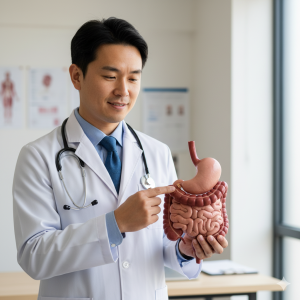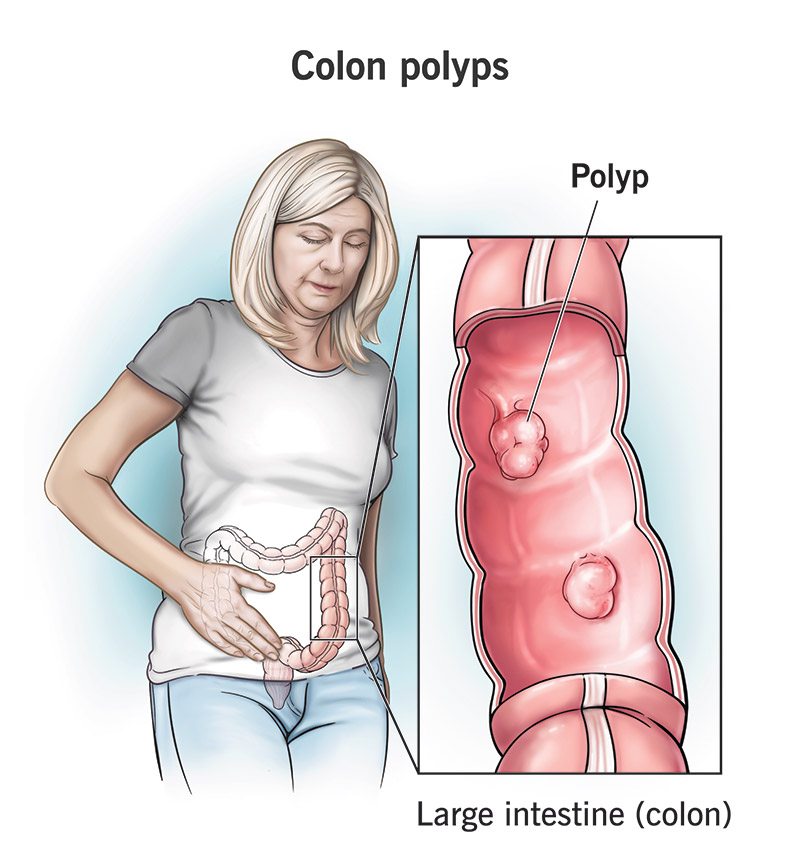
Instant Constipation Relief: 10 Doctor-Approved Foods That Work Fast
Introduction: When Relief Can’t Wait We’ve all been there: that uncomfortable, heavy, and sometimes painful feeling of being completely blocked.

Introduction: When Relief Can’t Wait We’ve all been there: that uncomfortable, heavy, and sometimes painful feeling of being completely blocked.

Colon polyps are formations that emerge on the inner surface of the colon, large intestine (colon) or rectum.
While many colon polyps are benign (noncancerous), there is still a risk that some may become malignant (cancerous). Only a small percentage of polyps will turn cancerous, and even then, it generally takes years for this transformation to occur. This long development period provides a crucial opportunity for early detection and removal through routine screenings, which is essential in preventing colorectal cancer.
What Are Colon Polyps?
Colon polyps are clusters of abnormal cells that develop on the inner surface of the colon or rectum. These growths come in various sizes and shapes, from small, flat patches to larger, stalked growths that resemble mushrooms. Though most polyps are harmless, the potential for some to become cancerous makes early detection and removal crucial for preventing colorectal cancer.
Symptoms of Colon Polyps: Recognizing the Warning Signs Early
Unlike many conditions, early-stage colon polyps often develop silently without producing noticeable symptoms. This silent progression is part of the reason why regular screenings are so important. However, as polyps grow larger or begin to cause complications, they may present a variety of symptoms. Recognizing these signs and seeking timely medical attention can significantly affect outcomes.
What to Look For- Rectal bleeding is a frequent indicator of colon polyps. You might observe bright red blood on the toilet paper, within the stool, or in the toilet bowl after a bowel movement. Sometimes, the blood may be darker and mixed with stool, indicating bleeding higher in the colon. While rectal bleeding can also result from other conditions like hemorrhoids, it should never be ignored. Any unexplained bleeding is a clear signal to seek medical attention.
What to Look For- Persistent alterations in your bowel habits, including diarrhea, constipation, or changes in stool consistency lasting more than a week, could indicate the presence of polyps. Polyps can grow large enough to partially obstruct the bowel, altering how stool moves through the colon. The result may be irregular bowel movements, including narrower stools, a sudden shift in the frequency of bowel movements, or an alternating pattern of diarrhea and constipation.
What to Look For- As polyps develop, they can lead to abdominal discomfort or pain. This pain can be intermittent or persistent, ranging from mild cramping to more severe discomfort. Larger polyps can obstruct the colon, leading to pain, bloating, or a feeling of fullness. Suppose you’re experiencing ongoing abdominal pain that doesn’t resolve on its own. In that case, it’s essential to have it checked out by a healthcare provider.
What to Look For- Polyps may occasionally cause slow bleeding, leading to a subtle but continuous loss of blood that might not be immediately apparent. This ongoing blood loss can result in iron deficiency anemia, characterized by fatigue, pale complexion, weakness, dizziness, and shortness of breath. Anemia can be detected through routine blood tests, and its presence, especially when unexplained, can indicate bleeding polyps.
What to Look For- Losing weight without trying or making any changes to your diet or activity level is another potential symptom of colon polyps. This can happen when polyps grow large enough to interfere with nutrient absorption or cause significant bleeding or obstruction in the colon. Unintentional weight loss should be considered a red flag and warrants further medical evaluation.
What to Look For- Fatigue and weakness are often linked to anemia caused by chronic blood loss from polyps. If you notice persistent exhaustion that doesn’t improve with rest, along with other symptoms like rectal bleeding or abdominal discomfort, it could be a sign that polyps are causing blood loss.
What to Look For- Anemia caused by bleeding polyps can sometimes become severe, leading to noticeable breathlessness during routine activities. Feeling winded while performing tasks that normally wouldn’t tire you out could be related to anemia from chronic blood loss.
What to Look For- A sensation that your bowel doesn’t empty after a bowel movement can indicate large polyps partially obstructing the colon. This symptom is often accompanied by changes in stool shape, such as narrow, pencil-like stools or a feeling of urgency without producing much stool.
Understanding the different types of colon polyps can help assess the risk of cancer development:
-> Characteristics: These are the most common, accounting for two-thirds of all colon polyps.
-> Cancer Risk: Adenomas are considered precancerous and have varying potential to turn into cancer. Based on their growth patterns and cancer risk, they can be further classified as tubular, villous, or tubulovillous.
-> Characteristics: Typically small and located in the rectum or lower colon.
-> Cancer Risk: These polyps are usually benign, but larger hyperplastic polyps may increase the need for more frequent screenings.
-> Characteristics: These polyps are broader and flatter than adenomas, and their sessile serrated polyps have a saw-tooth appearance under microscopic examination.
-> Cancer Risk: These polyps are at a higher risk of becoming cancerous, which is why they require careful monitoring.
Multiple factors may elevate the risk of developing colon polyps, such as:
A colonoscopy is the most reliable method for identifying and removing colon polyps. During this procedure:
Although certain risk factors such as age and genetics are immutable, embracing healthy lifestyle choices can lower the chances of developing polyps:
Individuals with a family history of colon polyps or colorectal cancer may benefit from genetic counseling:
At Colon & Digestive Health Specialists at Eastside Endoscopy Center,
we are committed to providing comprehensive care to prevent, detect, and treat colon polyps. Our expert team employs cutting-edge technology to guarantee optimal results for our patients. Early detection through regular screenings remains the most effective way to prevent colorectal cancer. Take charge of your health today—schedule your screening at Eastside Endoscopy Center and take the first step towards a healthier future.
———————————————————————————————————————
Reference:
This article references information from an MSN Health article. You can read the full article here.
______________________________________________________________________
Dr. Karim Shakoor, M.D. is a board-certified gastroenterologist and founder of Colon & Digestive Health Specialists, LLC. He completed his residency and fellowship at Cook County Hospital, which is known for having one of the most extensive programs in the country. Karim Shakoor, M.D. is dedicated to providing his patients with the highest level of care to improve their quality of life. He specializes in the treatment of digestive disorders, including abdominal pain, colon cancer, constipation, diarrhea, diverticulitis, gas, gastrointestinal bleeding, heartburn, irritable bowel syndrome, peptic ulcers, swallowing difficulty, and ulcerative colitis.
© 2024 All Rights reserved © 2024 by Colon & Digestive Health Specialists